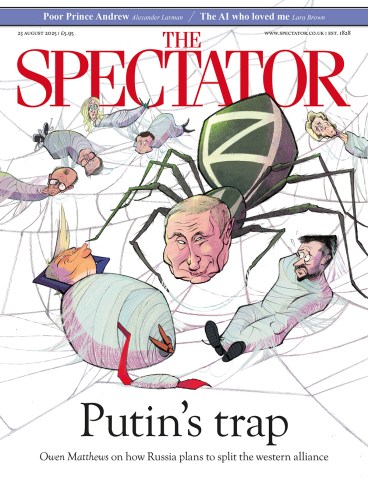
‘Is it any good?’ a friend asked when he saw I was reading this book. ‘Yes,’ I said, ‘but it’s full of wankers.’ By that stage I was only up to page 24, but the remaining 184 pages did nothing to fundamentally alter my view.
There is nothing intrinsically wrong with this. The works of, say, Geoffrey Chaucer and Jane Austen, not to mention thousands of others, would be considerably poorer if all the tiresome people were filtered out. But it does make it hard to read TonyInterruptor for more than 30 pages at a stretch. One has to pinch the bridge of the nose and go for a little walk.
The story begins at an improvised jazz performance (of course it does), when, in the middle of a ‘particularly devastating’ trumpet solo, a man in the audience stands up and asks: ‘Is this honest? Are we all being honest here?’ The incident is filmed by a 16-year-old, who for some reason has a quarter of a million followers on a social media platform. The clip goes viral, the trumpeter denigrates the heckler as #tonyinterruptor, and because of the magic of the internet, and of course the whim of the author, everything becomes even worse. Somehow.
Nicola Barker is vague as to precisely how people’s lives are upended by sudden, spurious attention. This is a comedy of ideas, which means that the characters spend most of the time arguing about what is honest, wherein authenticity resides, etc. If this makes the book sound unbearable, it shouldn’t; but it does very much tremble on the cliff edge of absurdity. We are in Iris Murdoch territory, where people have conversations that never happen in real life. I have just opened the book at random to find an example:
‘If it helps at all, I’ve always felt – at a profound level – that compartmentalising fixed group identities, whatever you want to call it, is simply a defence against paradox. And life is paradox, Sasha. Life is – and has always been – paradox.’
I trust you get the picture.
What saves the novel is its humour. Sasha, in the quote above, is the interrupted trumpeter, and it’s a toss-up between him and at least two other characters as to whether he’s the most annoying person in the book. (When we learn that he has a ‘soul patch’ – one of those tiny tufts of beard just underneath the lower lip – it comes as no surprise whatsoever.) But he is humanised in this conversation by a hiccup. ‘Oops. He clears his throat. Then he hiccups again. He frowns. “Kippers,” he announces. “For lunch.” He burps gently, behind his knuckles.’
This I find exquisite. There is the frown, an acknowledgment that his poise has been undermined, and then the word ‘kippers’, which can never not be funny. And he doesn’t say it, he announces it. Barker does this all the way through, sprinkling just the right words in the right places to keep us smiling. Interestingly, the word ‘oops’ pops up quite a few times; and because they’re arguing about abstractions, the characters spend a lot of time either trying to find the right word or correcting someone when they haven’t managed it. And there is nothing like a bit of reality – a kipper, for example – to bring one back to earth.
But while Barker is at pains to demonstrate how ghastly and self-obsessed these people are, she is not cruel. (We are in an unnamed Kent cathedral city, which kind of narrows it down; ‘hateful, hateful’ someone calls it, summarising the parochialism that the over-educated characters have to endure.) She gives these people their moments. At one point Sasha says: ‘If you aren’t living on the edge then you’re taking up too much fucking space.’ ‘Did you come up with that yourself?’ he is asked. He did not. He frowns (again) and answers: ‘I read it in an article in the National Geographic about an American mountaineer.’ Now that really is decent of Barker. She could have put it in as an authorial aside, to show us yet another aspect of Sasha’s ghastliness. But no, she grants him this moment of honesty. Which is, I suppose, what the whole book is about.








Comments